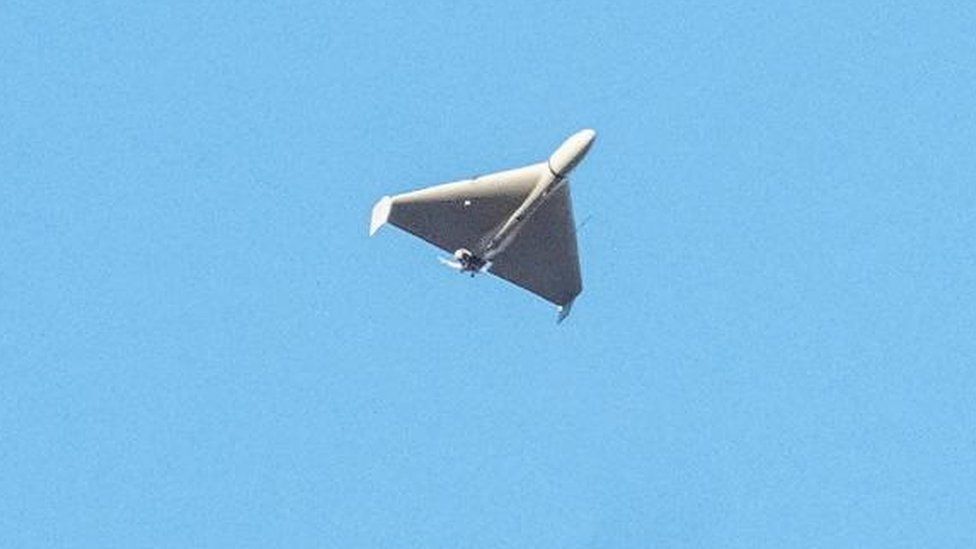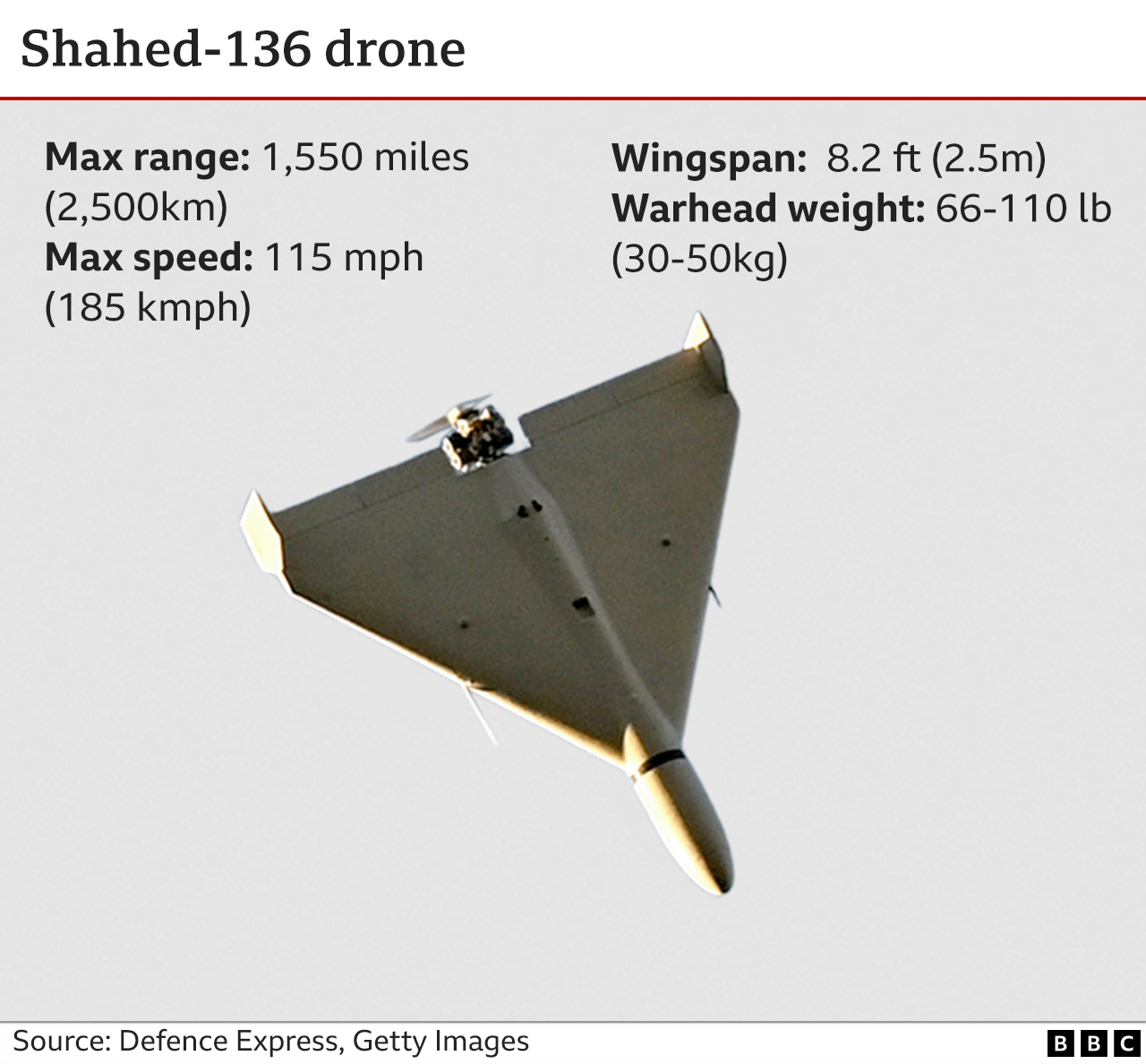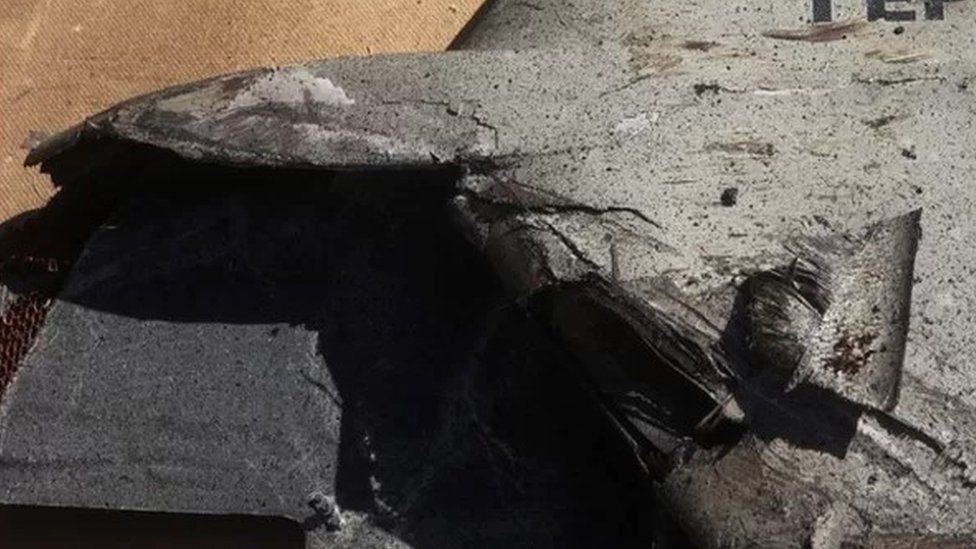 06-11-22, 06:14
06-11-22, 06:14
|
#187
|
Join Date: Feb 2011
Posts: 47,623
Thanks: 27,642
Thanked 14,458 Times in 10,262 Posts
|
 re: US Confirms Coms With Kremlin & ADMITS US Soldiers Now In Ukraine
re: US Confirms Coms With Kremlin & ADMITS US Soldiers Now In Ukraine
Ukraine WAR: Zelensky Accuses Iran of Lying Over Russia Support
Ukraine President Volodymyr Zelensky has accused Iran of "lying" and "terrorist cooperation" by supporting Russia's war in Ukraine.
Previously, Tehran denied the accusations, but on Saturday Iran's foreign minister said a small number of the vehicles had been sent to Moscow.
"We provided a limited number of drones to Russia many months prior to the Ukraine war," Hossein Amir-Abdollahian told reporters in Tehran.
BBC News 6 NOV 2022.
 It comes after Iran admitted for the first time it had supplied drones to Moscow, but only before the invasion.
It comes after Iran admitted for the first time it had supplied drones to Moscow, but only before the invasion.
The West believes Russia has used Iranian "kamikaze" drones to hit key infrastructure sites in Ukraine, but Iran and Moscow previously denied it.
Western officials have accused Iran of supplying drones to Russia and of providing personnel on the ground to train Russian drone pilots.
However, in an address on his Telegram channel, President Zelensky accused Iran of lying "even in this confession".
The 44-year-old claimed that Ukraine was shooting down about 10 Iranian drones every day, despite Iran saying it had only supplied Russia with a small number.
Mr Zelensky warned Iran about its support for Russia, saying this would backfire.
"We know for sure that Iranian instructors taught Russian terrorists how to use drones, and Tehran is generally silent about it.
"And if Iran continues lying about the obvious, it means that the world will make even more efforts to investigate the terrorist cooperation between the Russian and Iranian regimes and what Russia is paying Iran for such cooperation.
"There will be no such thing in the modern world that any of the terrorists or their accomplices will remain unpunished."
The US, EU and UK have all imposed sanctions on Iran for supplying drones to Russia for use in the conflict.
How is Russia using 'kamikaze' drones in Ukraine?
Russia-Iran ties over Ukraine pose new dangers
Russia has used the "kamikaze" drones - named after the Japanese suicide pilots in World War Two because they get destroyed on impact - to hit critical infrastructure sites across Ukraine.
As a consequence, rolling blackouts and restrictions on electricity use have been imposed just as the weather turns cold for winter.
Some Western leaders have called the attacks "war crimes", because under the Geneva Conventions - which define the rules of war - civilian infrastructure cannot be deliberately targeted.
On Saturday, Ukraine's national grid operator imposed further restrictions in some regions because electricity usage had grown compared to the same time last week.
Graphic of Shahed 136 Drone
 Growing Russia-Iran Ties Pose New Dangers
Growing Russia-Iran Ties Pose New Dangers
There are fears Iran could supply more sophisticated weapons to Russia in the future
For years the headlines have covered the controversies over advanced Russian air defence systems heading to Iran. But now the arms traffic is very much in the other direction, writes Jonathan Marcus of the Strategy and Security Institute, University of Exeter.
BBC News 6 NOV 2022.

Wreckage of a Shahed-136 (or Geranium-2) kamikaze drone shot down by Ukrainians
Iranian-supplied drones are being used by Moscow to terrorise Ukrainian civilians and to strike at the country's electricity generating and distribution system.
Russia's predicament in Ukraine has prompted Moscow to turn to Tehran for stocks of precision-guided weapons. Its own arsenals are fast running out.
There have been a number of instances where coastal defence and air defence missiles have been used by the Russians to strike at land targets in Ukraine - a role for which they are not best suited.
Transport flights have been monitored heading from Iran to Russia. Reports from US sources suggest that Iranian trainers from the IRGC - the Iranian Revolutionary Guard Corps - have deployed to a base in Crimea to teach Russian personnel how to operate the systems.
Wreckage from drones that have been shot down - both Iranian Shahed-131 loitering munitions (colloquially known as kamikaze drones) and the larger Shahed-136 - has been analysed. There is no doubt that Tehran, despite its denials, is compensating for a significant shortfall in Russia's arsenal.
This is clearly not good news for Ukraine. While a significant number of the Iranian-supplied drones have been shot down there could be worse to come.
Iran has more capable loitering munitions in its arsenal. And there are fears that even more dangerous Iranian weapons - ballistic missiles - could soon be on their way to Russia.
These carry much larger warheads than the drones and Ukraine's anti-ballistic missile capability is limited. This could add a new level of complexity to Western efforts to bolster Ukraine's anti-air and anti-missile defences.
New Tensions
But what of the wider ramifications of this deepening relationship between Moscow and Tehran?
There could be implications for the future of the moribund nuclear agreement between the international community and Tehran. Furthermore the delicate balance of forces in Syria could be altered with significant consequences for Israel and, in turn, for its relationship with Moscow.
Clearly both Russia and Iran need friends. They are both isolated and embattled.
Russia is facing economic sanctions due to its aggression against Ukraine, a war which is not going well for Moscow. Iran's regime is also under sanction for its nuclear programme and human rights record, and it is facing massive discontent at home.
They are both part of a small "club" of authoritarian nations, along with China, that seek not just to pursue their own regional strategic goals but also, more broadly, to strike back against what they see as a US-dominated global order.
Iran's security clamp-down at home has already drawn additional economic sanctions from the West. Now its weapons transfers to Russia are being seen by the United Kingdom and France as a breach of UN Security Council resolution 2231 that was passed in the wake of the 2015 nuclear deal.
This could potentially lead to some nuclear-related sanctions being restored. These new tensions will further undermine efforts to return to the JCPOA, the international deal designed to constrain Iran's nuclear activities which was abandoned by the Trump Administration in May 2018.
Efforts to restore the deal have lapsed at least until after the US Mid-Term elections on 8 November. Meanwhile Iran has continued to make progress in its enrichment activities.
The Iran nuclear dossier is a looming shadow for the West as its focus is firmly fixed upon Ukraine. Russia - one of the key parties to the original deal - is hardly going to pressure its new arms supplier to give ground.
Syria Factor
Nonetheless, the relationship between Moscow and Tehran is driven by circumstance rather than any deep ideological bond.
Russia's relationship with Iran has long had a measure of ambivalence; a good example is their differing ambitions in Syria.
Russia's military intervention saved the Assad regime. Iranian manpower, weaponry and militias were also crucial to his survival.
But Russia, which still maintains a presence in Syria, has never been enthusiastic about Tehran's regional ambitions there. However it has not acted to contain Iranian influence in quite the way Israel would have wished. That said, it has done little to thwart Israeli air strikes aimed at reversing Iran's build-up in Syria.
Could the new dynamic in Russia-Iranian relations change this? While some Russian air defences and troops have been removed from Syria Moscow still has the capacity to interfere with Israeli operations.
This has been one of the guiding concerns influencing Israel's tentative support for Ukraine.
But what of the future? Suppose for example that Russia decided to transfer even more advanced weaponry to Iran in return for its assistance, what then? Might this prompt a shift in Israel's attitude to Kyiv?
That for now, with an Israeli general election looming, seems unlikely. But the new Russia-Iran relationship has the potential to impact global affairs way beyond the war in Ukraine.
Jonathan Marcus is a former BBC Defence & Diplomatic Correspondent and now an honorary professor at the Centre for Strategy and Security at the University of Exeter UK
|

|

|